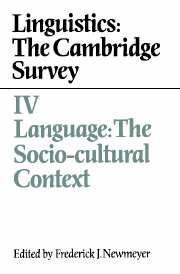Book contents
- Frontmatter
- Contents
- Contributors
- Preface
- 1 The study of language in its socio-cultural context
- 2 Language, culture, and world-view
- 3 Language and social class
- 4 Language and race: some implications for linguistic science
- 5 Language and gender
- 6 Bilingualism
- 7 Dialectology
- 8 Sociolinguistics and syntactic variation
- 9 Language birth: the processes of pidginization and creolization
- 10 Language death
- 11 Language planning: the view from linguistics
- 12 Ethnography of speaking: toward a linguistics of the praxis
- 13 The organization of discourse
- 14 Conversation analysis
- Index of names
- Index of subjects
- Contents of Volumes I, II, and III
1 - The study of language in its socio-cultural context
Published online by Cambridge University Press: 05 June 2012
- Frontmatter
- Contents
- Contributors
- Preface
- 1 The study of language in its socio-cultural context
- 2 Language, culture, and world-view
- 3 Language and social class
- 4 Language and race: some implications for linguistic science
- 5 Language and gender
- 6 Bilingualism
- 7 Dialectology
- 8 Sociolinguistics and syntactic variation
- 9 Language birth: the processes of pidginization and creolization
- 10 Language death
- 11 Language planning: the view from linguistics
- 12 Ethnography of speaking: toward a linguistics of the praxis
- 13 The organization of discourse
- 14 Conversation analysis
- Index of names
- Index of subjects
- Contents of Volumes I, II, and III
Summary
Introduction
It does not seem far-fetched to hold Chomsky indirectly responsible for the accelerated development of sociolinguistics and ethnolinguistics at the end of the 1960s and for the emphasis laid upon pragmatics and discourse analysis in the mid 1970s. Paradoxical as it may seem, his revival of the Saussurean langue–parole dichotomy (under the names ‘competence’ and ‘performance’), and, even more important, his assertion of the autonomy of syntax, sparked a renewed interest in the study of language in its socio-cultural context. Both these twin pillars of Chomskyan linguistics seemed to many to shut out most of the more interesting questions about language, in particular those relating to its functioning in society. As a consequence, a sizeable number of linguists struck out on their own, as it were, and devoted themselves to building alternative conceptions of language, in which its social function was regarded as paramount.
The reaction to Chomsky's position that the systematicity of language is confined to competence took a number of different forms. Some, seeing systematicity outside of competence in Chomsky's narrow use of the term, attempted to extend the notion of competence to cover most of the aspects that Chomsky ascribed to performance. An example is Hymes's (1972) ‘communicative competence,’ which he defined as the knowledge of the abstract rules of a language required to produce sound/meaning correspondences, and the ability to use those correspondences between sound, meaning, and form in socially and culturally appropriate ways.
- Type
- Chapter
- Information
- Linguistics: The Cambridge Survey , pp. 1 - 13Publisher: Cambridge University PressPrint publication year: 1988
- 4
- Cited by

